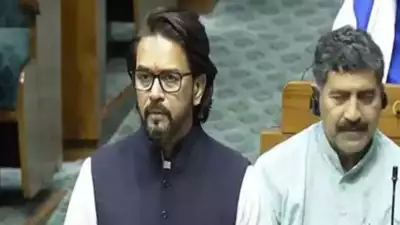
NEW DELHI: BJP MP Anurag Thakur on Wednesday brought up the alleged involvement of a Congress leader in the 2012 Karnataka Waqf Board land scam case during a debate in the Lok Sabha on the Waqf (Amendment) Bill, 2025.
Also Read: Politicians, middlemen, mafia in Rs 2 lakh crore Karnataka Waqf land scam
"The Karnataka government collected Rs 4.50 crore, and you spent that money. You should have answered those. Did you take the money from the masjid or the Waqf board?" Thakur asked while naming a leader which led to an outcry by the opposition MPs.
"Karnataka assembly's report has names of several Congress politicians who were involved in the scam. Is this why you (Congress) are opposing transparency and accountability?" he asked.
On the Speaker's directive, the minister however took back the name at the very moment.
In October last year, MPs representing opposition parties in the joint parliamentary panel on the Waqf Bill, had walked out of a meeting following deposition of Anwar Manippady, an ex-chairman of the Karnataka State Minorities Commission and a former vice president of the state BJP. Manippady had accused several Karnataka Congress leaders of involvement in misappropriating Waqf properties in Karnataka.
'Not a bill, but an UMEED': Anurag Thakur
During the discussion, Thakur referred to the proposed changes as "Umeed" (hope), an acronym for Unified Waqf Management Empowerment, Efficiency, and Development.
"This is not a bill, but an 'Umeed'. This 'Umeed' has empowerment, efficiency and development," Thakur stated, highlighting the growing support from various organizations for the amendment.
Further, he gave a call to amend the Waqf Board, claiming it had become a "base of atrocity and corruption."
He also thanked several minority groups, including the Catholic Bishops Conference of India, Church of Bharat, Kerala Council of Churches, Kerala Catholic Bishops' Council, All India Sufi Sajjadanashin Council, and Muslim Rashtriya Manch, for backing the bill.
Thakur noted that these bodies, from both Catholic and Muslim communities, recognized the importance of the reform. He stressed that the Waqf law, established during the Congress regime, had contributed to "widespread corruption."
.png)
 German (DE)
German (DE)  English (US)
English (US)  Spanish (ES)
Spanish (ES)  French (FR)
French (FR)  Hindi (IN)
Hindi (IN)  Italian (IT)
Italian (IT)  Russian (RU)
Russian (RU)  23 hours ago
2
23 hours ago
2









Comments